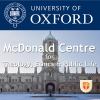"How Much is Enough? The Love of Money and the Case for the Good Life" Session 2
In 1930 John Maynard Keynes predicted that, over the next century, income would rise steadily, people’s basic needs would be met, and no one would have to work more than fifteen hours a week. Why was he wrong? In How Much is Enough? The Love of Money and the Case for the Good Life (Penguin, 2012 and 2013), Robert and Edward Skidelsky argue that wealth is not—or should not be—an end in itself, but rather a means to the good life. Observing how far modern life has strayed from that ideal, and rejecting the claim that there is any single measure of human well-being—whether GDP or ‘happiness’—they analyse the good life into seven elements, argue that a healthy liberal society should promote them, and propose a set of policies to realise them. In this McDonald Centre conference, held at Christ Church, Oxford on 28 February 2014, the Skidelskys debate with theologians Rowan Williams and John Hughes; philosopher Cecile Fabre; economicsts Donald Hay, Edmund Newell, John Thanassoulis, and David Vines; and journalist Diane Coyle.




